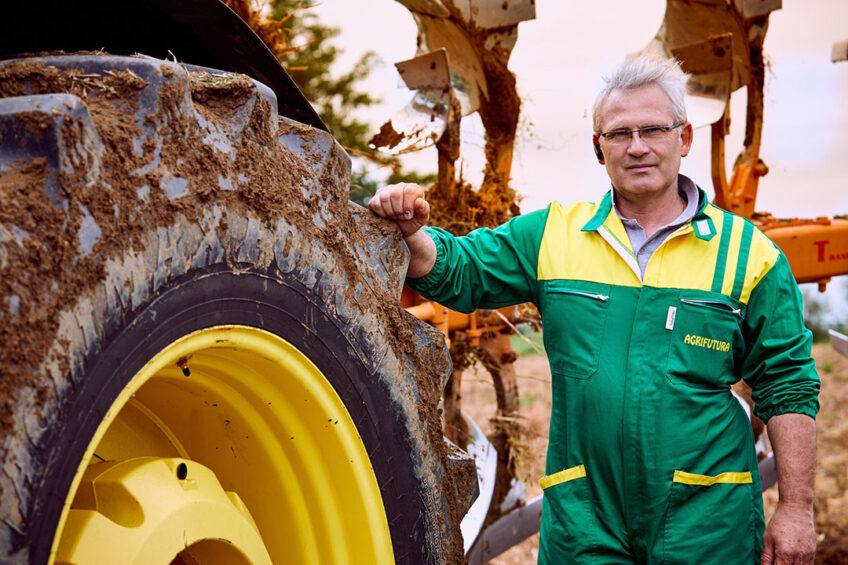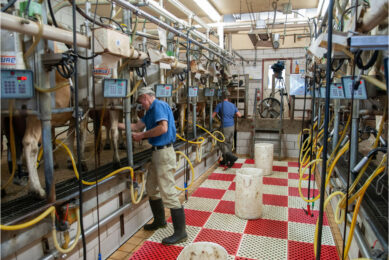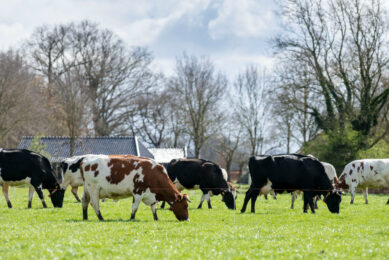Running a dairy farm and business in harmony

Dairy farms across Europe and beyond are traditionally handed down through generations and seldom change direction in terms of sector. As families grow in size, sometimes additional enterprises are added to the core farm business to increase greater income and create more family employment.
That strong dairying tradition is very relevant in the Caligari family in Italy. They run the Crocetta company and do not only milk cows but also operate a large contracting business. The farm is based in the northern part of Italy at Pralboino in the province of Brescia.
Angelo Caligari, 1 of the 3 partners and owners of the Crocetta company, is the 3rd generation brought up on the farm. He spent his childhood helping with the livestock. Angelo says: “My family has always been involved in milk production and my grandparents started the business here in 1935. I was practically born and brought up doing this work.

“Our farm covers around 150 hectares, and we also work as subcontractors, managing other owners land. So in total, we are talking about over 400 hectares under our management each year,” he adds.
When the Crocetta farm was started, rearing livestock was among the main activities in the area and the children and grandchildren then continued that work. Crocetta is based in the Po Valley where raising dairy cows was, and still is, very popular.
Angelo states, “There are 3 of us running the farm now and we are all cousins, partners and owners. Each of us manages a different part of the company.
Profile
Crocetta farm was started in 1935 and today runs 670 Friesian cows on its 150 hectares. Cousins, partners and owners Angelo, Fausto and Costanzo Caligari each manage a different part of the company. The cows produce 30/31 litres per day, with the milk’s butterfat at 4.15% and protein averages between 3.55 and 3.59%.
Milking
“There are 670 Friesian cows in total on our farm. They are kept in the sheds and milked twice a day. The average yield per cow is around 30/31 litres per day at the moment. We have now started the high production period with cows feeding on fresh grass and this has increased the yield by around 3 litres a day. This will go on until June, when the weather here in the Po Valley becomes humid and, despite the air conditioning systems that we have installed, the humidity lowers the level of productivity, at least until November.”
The cows are split into 3 milking groups into 3 sheds on the farm depending on yield and calving stage. Although the farm keeps 3 bulls in the herd the family uses AI on most of the cows. Angelo says there are always around 480 calves and followers in the herd and that he watches over around 50 births each month.
“Currently, we have 7 workers engaged in milking and 4 in growing fodder, in addition to us 3 partners of course,” comments Angelo. “Our current average price of milk is 39 cents per litre. We produce milk solely to make hard grana cheese, so we follow rules that regulate this type of activity.”

The farm runs 3 milking parlours in total, including a TDM 11+11 herringbone parlour in the first shed, a Tecnozoo 9+9 herringbone parlour in shed two and a DeLaval 6+6 herringbone parlour in the 3rd shed. The cows are fed a nutritionally balanced Total Mixed Ration produced from a range of ingredients including cut corn, protein hay, rye grass, straw, soya, protein concentrates, sorghum, flour, corn mash and wheat silage. Angelo uses a number of Unifeed trailed mixer wagons to dispense the feed to the cows.
Contracting business and lack of workers
Operating a busy dairy farm and a contracting business requires continual investments in modern machinery, technology and equipment to maintain efficiency and hopefully save costs. Angelo adds that, “We have invested a lot in machinery, including John Deere tractors and BKT tyres, and currently have around 60 tractors of all types and power ranges. We have just bought a 400hp John Deere 8370R and we have a tractor equipped with satellite navigation. We also use four telehandlers boosted with the latest technology.

“In our dairy business we also try to invest but we have some challenges there. We would really like to expand our dairy farm, but our biggest problem is the lack of workers. We cannot find them. “Unfortunately, it seems that the young generations are not interested in this work, and it is really difficult for me to understand why. Nowadays the job of a dairy farmer is becoming much more automated and the machinery helps a lot. It is not the manual job it once was but yet the young people do not wish to follow this path.

“Unfortunately, if we cannot find enough labour, so we will be forced to entrust part of our business to other subcontractors. We are closely looking at the possibility.
“This Covid-19 pandemic certainly has not helped this already complex process of recruitment. We hope we can find some new workers soon!” adds Angelo.
Join 13,000+ subscribers
Subscribe to our newsletter to stay updated about all the need-to-know content in the dairy sector, two times a week.










